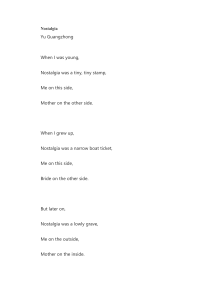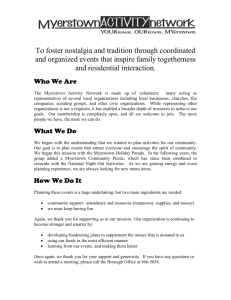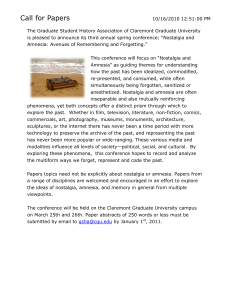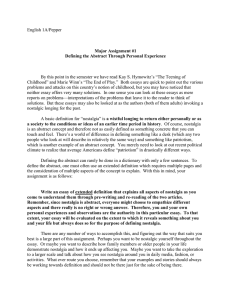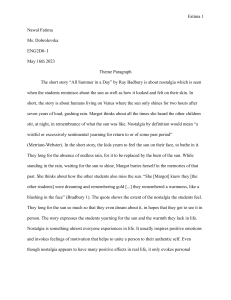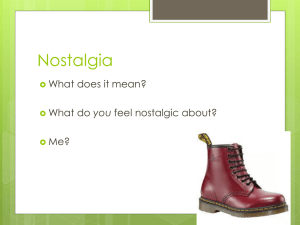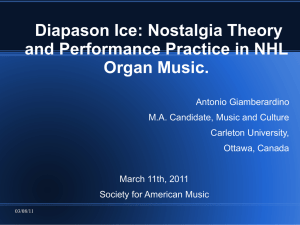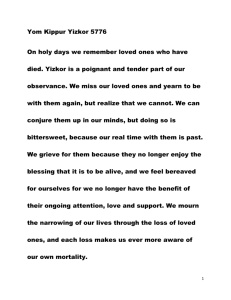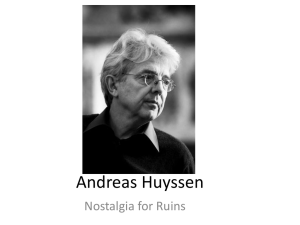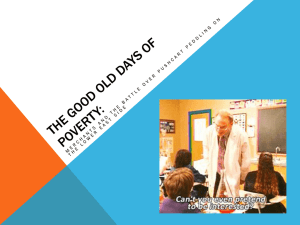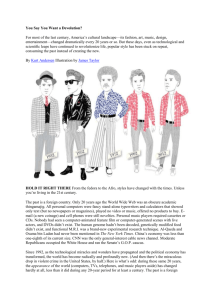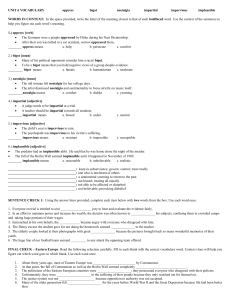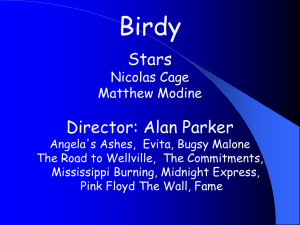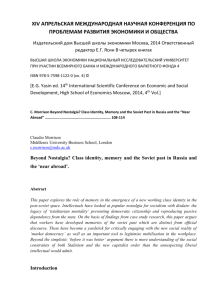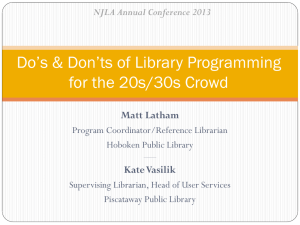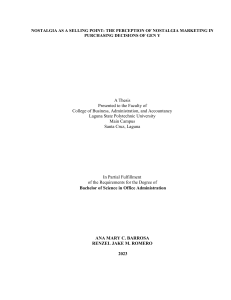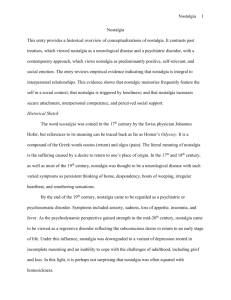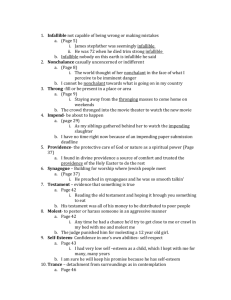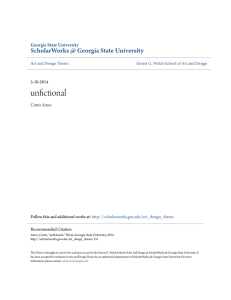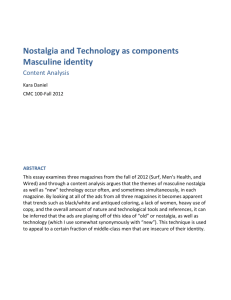Call for abstracts: THE FUTURE OF NOSTALGIA IN THE MIDDLE
advertisement
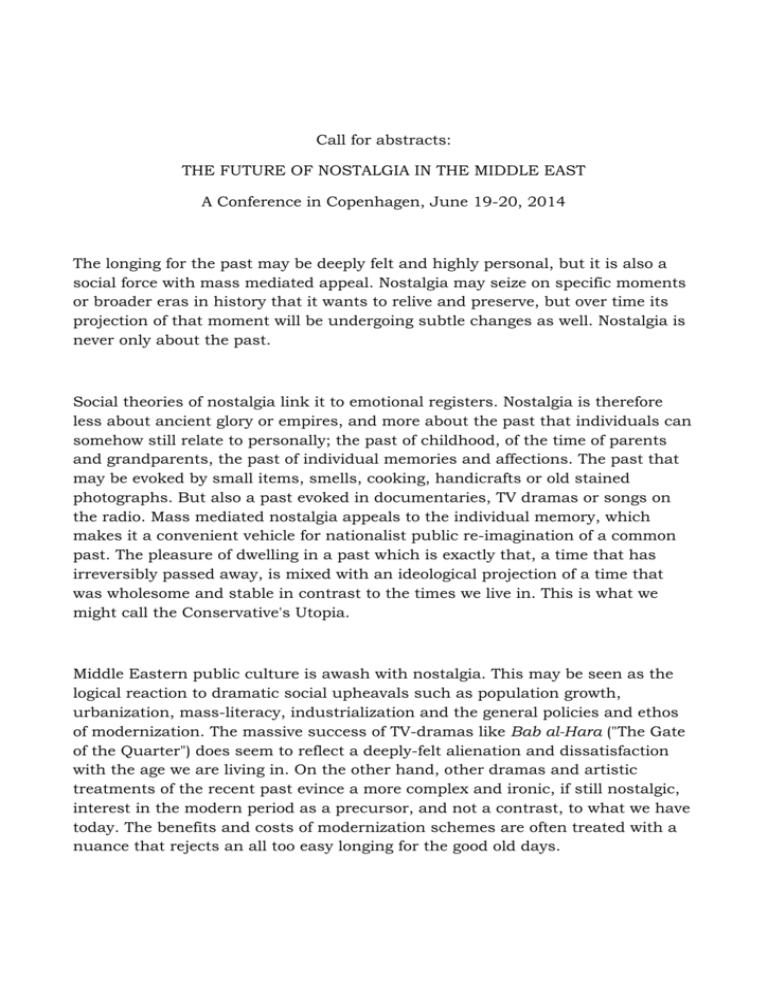
Call for abstracts: THE FUTURE OF NOSTALGIA IN THE MIDDLE EAST A Conference in Copenhagen, June 19-20, 2014 The longing for the past may be deeply felt and highly personal, but it is also a social force with mass mediated appeal. Nostalgia may seize on specific moments or broader eras in history that it wants to relive and preserve, but over time its projection of that moment will be undergoing subtle changes as well. Nostalgia is never only about the past. Social theories of nostalgia link it to emotional registers. Nostalgia is therefore less about ancient glory or empires, and more about the past that individuals can somehow still relate to personally; the past of childhood, of the time of parents and grandparents, the past of individual memories and affections. The past that may be evoked by small items, smells, cooking, handicrafts or old stained photographs. But also a past evoked in documentaries, TV dramas or songs on the radio. Mass mediated nostalgia appeals to the individual memory, which makes it a convenient vehicle for nationalist public re-imagination of a common past. The pleasure of dwelling in a past which is exactly that, a time that has irreversibly passed away, is mixed with an ideological projection of a time that was wholesome and stable in contrast to the times we live in. This is what we might call the Conservative's Utopia. Middle Eastern public culture is awash with nostalgia. This may be seen as the logical reaction to dramatic social upheavals such as population growth, urbanization, mass-literacy, industrialization and the general policies and ethos of modernization. The massive success of TV-dramas like Bab al-Hara ("The Gate of the Quarter") does seem to reflect a deeply-felt alienation and dissatisfaction with the age we are living in. On the other hand, other dramas and artistic treatments of the recent past evince a more complex and ironic, if still nostalgic, interest in the modern period as a precursor, and not a contrast, to what we have today. The benefits and costs of modernization schemes are often treated with a nuance that rejects an all too easy longing for the good old days. Recent decades of stifling authoritarian culture have bred specific political nostalgias. Nationalists look back to the time of independence, Liberals to the "Liberal Age", Socialists often to the 1950s and 60s. With time, the age of the ancien régime has been redeemed in some circles, whether the royalties of Egypt and Iraq, the belle époque of Mediterranean ports like Algiers, Alexandria or Beirut, pre-Wahhabi Jeddah or Ottoman Istanbul. The Modernist paradigm in politics, art and culture has long given way to more complex treatments of the past, and even Modernism itself sometimes holds a nostalgic appeal to certain groups. Nostalgia, in short, seems to be an integral part of modernity, but at the same time it changes with the age we are living in. It seems a fair guess that, along with other political and social upheavals, the uprisings of 2011-14 are bound to create and shape new nostalgias, as well. The conference will explore the changing objects and character of Middle Eastern public nostalgias. The organizers at University of Copenhagen are a group of scholars working on contemporary Middle Eastern media and the new types of publics that have emerged with the spread of the internet and satellite TV. Submission of proposals: Please send a 250 word abstract for consideration to Charlott Hoffmann Jensen: charlott@hum.ku.dk (with the subject line “THE FUTURE OF NOSTALGIA IN THE MIDDLE EAST”). Abstract, following this order: author(s), affiliation, email address, title of abstract, body of abstract, short CV (max. 150 words). Selection of the papers will be made on the basis of quality and relevance to the conference theme. Only accepted papers will get an answer by the date mentioned below. Deadlines: o o Submission of abstracts: 1st of March 2014. Notification of acceptance of abstracts: 17th of March 2014. Financial and other support: The successful participants will be provided basic accommodation free of cost for a maximum of three nights for participants within Europe; for participants outside Europe individual arrangement will be made.
